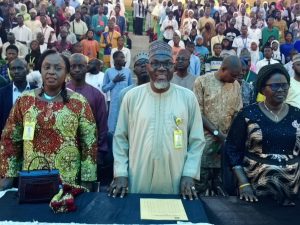

President-elect, Nigerian Academy of Science and Professor Emeritus, Faculty of Engineering and Environmental Designs, Usmanu Danfodiyo University, Sokoto, Abubakar Sambo, has advocated the regionalisation of the National Grid to curb the incessant collapses of the National Grid.
 Professor Sambo made this call on Thursday while delivering the 12th Convocation Lecture of the Kwara State University (KWASU), Malete, titled, “The Optimum Utilisation of Nigeria’s Energy Resources for the Sustainable Growth and Development of the Nation”.
Professor Sambo made this call on Thursday while delivering the 12th Convocation Lecture of the Kwara State University (KWASU), Malete, titled, “The Optimum Utilisation of Nigeria’s Energy Resources for the Sustainable Growth and Development of the Nation”.
The Professor Emeritus also stressed that the recent power outage in 17 States of the nation, caused by damage of transmission towers in one State by bandits, should not be allowed to happen in the future.
As a step towards the regionalisation of the National Grid, Professor Sambo said that States should ensure they have state-wide grids as part of establishing their own electricity markets as provided by Electricity Act 2023.
“All State Grids can operate independently such that faults in one state will not affect other states”, he said, adding that all State Grids should be interconnected with the grids
of contiguous states.
He also suggested that dispatchable power plants should be available in States and to be located at strategic points along the National Grid, saying that renewable energy power plants and
small modular reactors have been found to be effective dispatchable power plants.
“The Supervisory Control and Data Acquisition (SCADA), which TCN says it is only 70% completed and which enables real-time monitoring
and control of the grid, allowing operators to detect faults, manage loads effectively and respond to
issues swiftly, should be completed as quickly as possible”, he said.
He also called for institution of effective security monitoring of energy infrastructure, “such that cameras and sensors can effectively send out signals before
damages or theft of energy supply components are done”.
Professor Sambo opined that providing adequate and reliable energy supply with expanded
energy mix to ensure high level of security of supply and in line
with the nation’s energy demand and supply projections, is
the panacea for sustainable development of the country.
“Securing energy infrastructure from vandalisation, by terrorists and thieves, is a necessary measure to avoid disruption in energy supplies. The very recent inauguration of the Council for Securing National Critical Infrastructure, by the Federal Government, is a move in the
right direction.
“The local production of power plant components like transformers, solar modules and their balance of systems components of inverters, deep cycle rechargeable batteries and charge controllers, along the lines of what NASENI and a few others have started, should be supported and expanded to cater for the nation’s needs and to key into the AfCFTA initiative, for export to other nations, in the long term.
“With the Petroleum Industry Act coming into effect in 2021 and the
more recent Electricity Act 2023, the coast is clear for the optimal
use of the nation’s conventional and renewable energy resources to
provide for the socio-economic growth of the nation in general and
to specifically provide for large energy needs of:
a. Large-scale agriculture and agro-allied industries.
b. Large-scale open cast and underground mines and
mineral processing plants.
c. Several manufacturing industries in areas the nation has comparative advantages.
d. Several tourism sites with facilities of international
standards.
“Providing energy for agriculture, mining, manufacturing and
tourism will enable generation of revenue other than the revenue
from sale of oil and gas and ensure that Nigeria does not slip to
economic recession whenever a pandemic like COVID-19 occurs.
“The National Action Plan on EVs, produced by the NADDC, should be approved and implemented. In the same vein, there is the need for the local production of electric vehicles in the country.
“There is need to ensure that the energy supply is based on the
nation’s Energy Transition Plan which is based on Nigeria’s
commitment to the Net-Zero carbon emission pledge by 2060 and reflecting the nation’s Nationally Determined Contributions for abating climate change but in line with its “Just Energy Transition Policy (JETP)”.
“It is necessary for the JETP to actively embrace all the low-carbon energy systems of renewable energy sources and nuclear power. Net Zero is not Absolute Zero, This means if the nation can institute carbon capture techniques and establish forestry plantations, which are natural carbon sinks, the nation can continue using oil and gas even beyond 2060”, he said.
In his welcome address, the Vice Chancellor, KWASU, Professor Shaykh Luqman Jimoh, said that the theme of the lecture was both timely and crucial, considering the vital role energy plays in shaping the socio- economic development of any nation.
The VC said KWASU remained resolute in its mission to foster intellectual growth and contribute to national development, adding that the lecture exemplified the institution’s commitment to addressing critical issues and proffering practical solutions through the power of knowledge.
Also, the Chairman of the occasion, Alhaji Sheriff Sagaya, who was represented by Barrister Abdulfatah Salman, called on governments to always consider issues about youth of the nation, saying that, “if youth are educated, the nation would be great”.
He also charged youth to prepare for life before them and to utilize youthful energy in productive ventures. “Future of Nigeria rests on you”, he told Nigerian youth, as he also challenged them to see obstacles as springboard. Alhaji Sagaya donated N10m towards development of the school.
